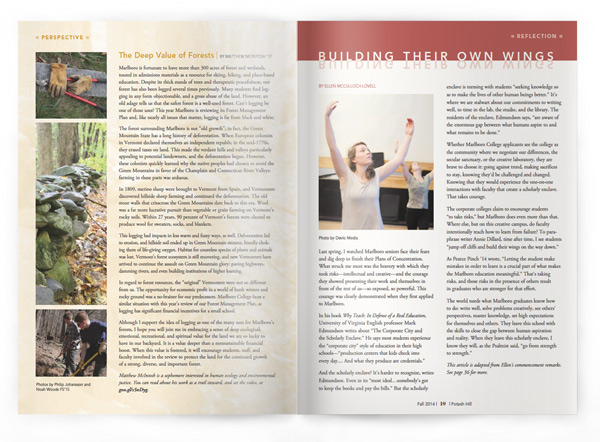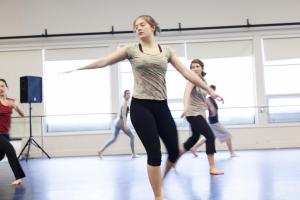Building Their Own Wings

Perspective
By Ellen McCulloch-Lovell
Last spring, I watched Marlboro seniors face their fears and dig deep to finish their Plans of Concentration. What struck me most was the bravery with which they took risks—intellectual and creative—and the courage they showed presenting their work and themselves in front of the rest of us—so exposed, so powerful. This courage was clearly demonstrated when they first applied to Marlboro.

In his book Why Teach: In Defense of a Real Education, University of Virginia English professor Mark Edmundson writes about “The Corporate City and the Scholarly Enclave.” He says most students experience the “corporate city” style of education in their high schools—“production centers that kids check into every day…. And what they produce are credentials.”
And the scholarly enclave? It’s harder to recognize, writes Edmundson. Even in its “most ideal…somebody’s got to keep the books and pay the bills.” But the scholarly enclave is teeming with students “seeking knowledge so as to make the lives of other human beings better.” It’s where we are stalwart about our commitments to writing well, to time in the lab, the studio, and the library. The residents of the enclave, Edmundson says, “are aware of the enormous gap between what humans aspire to and what remains to be done.”
Whether Marlboro College applicants see the college as the community where we negotiate our differences, the secular sanctuary, or the creative laboratory, they are brave to choose it: going against trend, making sacrifices to stay, knowing they’d be challenged and changed. Knowing that they would experience the one-on-one interactions with faculty that create a scholarly enclave. That takes courage.
The corporate colleges claim to encourage students “to take risks,” but Marlboro does even more than that. Where else, but on this creative campus, do faculty intentionally teach how to learn from failure? To paraphrase writer Annie Dillard, time after time, I see students “jump off cliffs and build their wings on the way down.”
As Pearce Pinch ’14 wrote, “Letting the student make mistakes in order to learn is a crucial part of what makes the Marlboro education meaningful.” That’s taking risks, and those risks in the presence of others result in graduates who are stronger for that effort.
The world needs what Marlboro graduates know how to do: write well, solve problems creatively, see others’ perspectives, master knowledge, set high expectations for themselves and others. They leave this school with the skills to close the gap between human aspiration and reality. When they leave this scholarly enclave, I know they will, as the Psalmist said, “go from strength to strength.”
This article is adapted from Ellen’s commencement remarks.
